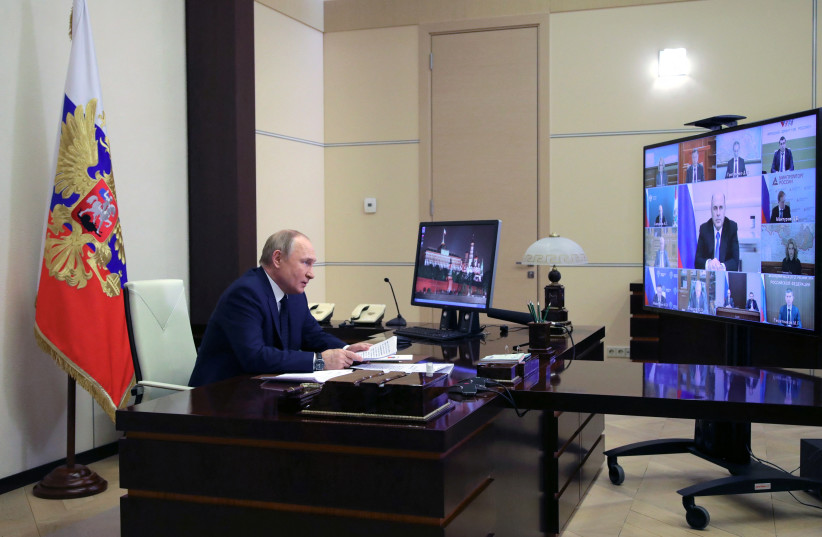‘Defeat is an orphan,” observed John Kennedy in a famous, but baseless, quip.
Yes, defeat’s parents would love to disown it, but others will always be there to remind them of their parenthood, and make them pay for what they conceived.
The defeats of Germany, Austria, Russia and Turkey in World War I resulted in all their monarchs’ downfalls, as did France’s trouncing by Germany in 1870. Defeat doesn’t even have to be clear for a leader to fall down. Just think of Lyndon Johnson in the middle of the Vietnam War, or Menachem Begin during the First Lebanon War or Golda Meir in the aftermath of the Yom Kippur War.
Will war, then, spell the end of Vladimir Putin’s reign, and if it will, how will that happen?
The war’s first month was clearly catastrophic for Putin.

The opening act, an attempt to land commandos in Kyiv and unseat its government – has failed. The consequent invasion has stalled, suffered great losses, and exposed military flaws and logistical ineptitude. The subsequent effort to besiege cities has so far failed to subdue their defenders, and instead redoubled their motivation and resolve.
True, the war is still young. Its military tide might yet turn, and even if it doesn’t, Russia’s defeat might take years to mature. Even so, Putin might be removed before that, in one of three ways. The first is assassination.
ASSASSINATIONS are often about ideology. That is what drove the killers of Abraham Lincoln, Anwar Sadat and Yitzhak Rabin, who believed, respectively, in slavery, Islamism, and a greater Israel. Ideology is also what drove the Socialist assassins of Tsar Alexander II.
The conviction that might now drive a Russian assassin can be democracy, the idea Putin has fought more devotedly than anyone since Joseph Stalin. To this, many would ask whether most Russians actually want democracy. That’s a valid doubt.
Democracy sank roots in many post-communist realms, from Romania to Latvia, but not in Russia. One can argue that where the people wanted it – democracy evolved, and where it didn’t, people didn’t want it. Whatever this impression’s validity, it should be noted that the movement that assassinated the tsar in 1881 numbered but several thousand members, and the assassins were a cell of merely four.
This is beside the fact that assassins were often driven by raw emotions rather than big ideas. Simple revulsion with war’s futility can suffice, should the war lag and soldiers’ funerals abound.
To this some would say that millions of Russians actually share Putin’s imperial longings, and readily buy what he tells them about the bloodshed, displacement and carnage he is unleashing in their name.
To them we must note that many wars of choice began with patriotic jingoism that evaporated as soon as victory’s prospects faded. John Wayne’s government-backed, pro-Vietnam War flick The Green Berets (1968) was a box office success, but most Americans still ended up abhorring that war. Regardless of the war Putin engineered, his assassin might be a relative, friend, or fan of one of the assorted political opponents, critical journalists, or corporate tycoons his operation reportedly poisoned, defenestrated, or shot dead.
That, in brief, is one way Putin’s violent career might end. The second is a coup.
MOST COUPS are plotted by generals driven by sheer power hunger, the way Idi Amin took over Uganda in 1971.
Chances of this happening right now in Russia are low. The generals fear Putin. They know all about his ability and readiness to target anyone who stands in his way. Regardless of this, Russian generals never staged a coup, and today’s are not known to have political appetites.
However, some military coups were not about power hunger, but about frustration in the face of national crises. That is what happened in Spain, where General Francisco Franco seized power following social upheaval he did not engineer, and that is what happened in the coup that brought Napoleon to power after the army suffered defeats, and Europe’s kingdoms prepared to invade France.
That is also what happened in Poland in 1981, when the communist government failed to handle street protests stoked by food rationing, fuel shortages, labor unrest and a debt crisis. Impatient with the growing disorder, General Wojciech Jaruzelski imposed martial law and then ruled Poland for eight years.
Considering the financial mayhem and international siege Putin has caused, shortages, unemployment, inflation and social dislocation are ready to spiral. If coupled with more military failure in Ukraine and soldiers’ funerals in Russia, some generals might find Poland’s precedent inspiring, and some politicians might find Napoleon’s precedent inescapable.
Does all this mean that Putin will be removed? It doesn’t, but it does mean that conditions for his ouster are ripening by the day. That is why he would be wise to recall two non-military coups that happened in his country, and the third kind of political departure in which one of them ended.
IN THE February Revolution of 1917, Tsar Nicholas II was deposed after the army was trounced in World War I while food supplies fell, strikes abounded, and inflation soared. Like Putin, the tsar repeatedly unleashed police on rioters. It worked, until one day the troops joined the demonstrators.
The second coup came in 1964, when the Communist Party Central Committee, backed by the KGB, replaced Nikita Khrushchev, mainly because they got sick of his control, impulsiveness and rudeness. Eager to minimize drama, the plotters’ method was neither assassination nor military coup. Instead, they forced Khrushchev to resign, citing his “advanced age and ill health.” Led by his successor, Leonid Brezhnev, the people who forced this resignation did so shortly after attending Khrushchev’s 70th birthday party.
Vladimir Putin, incidentally, will be 70 next fall.
www.MiddleIsrael.net
The writer’s bestselling Mitzad Ha’ivelet Ha’yehudi (The Jewish March of Folly, YediotSefarim, 2019), is a revisionist history of the Jewish people’s leadership from antiquity to modernity.
